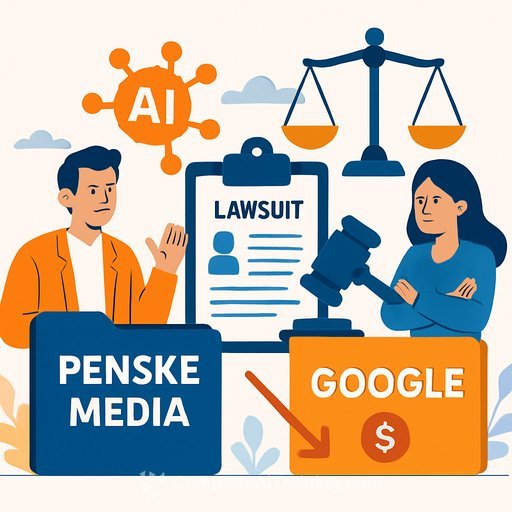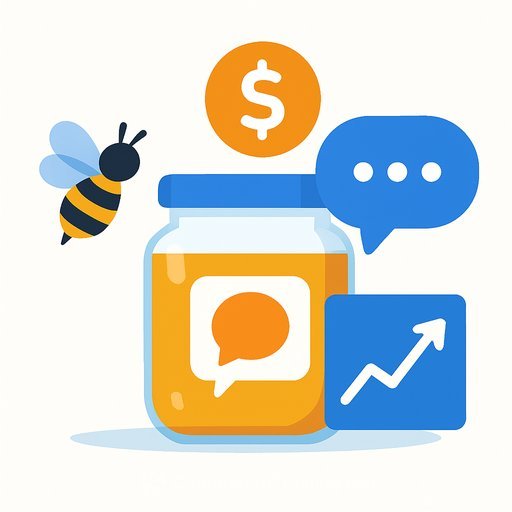Penske Media Sues Google Over AI Overviews: What PR and Communications Teams Need to Do Now
Penske Media, owner of Rolling Stone, Billboard, and Variety, has filed a federal lawsuit against Google over AI-generated summaries in Search. The complaint claims Google's AI Overviews use Penske's journalism without permission, cut referral traffic, and reduce revenue. It also alleges Google ties search visibility to allowing content in AI summaries, forcing publishers to give ground without compensation.
The case was filed in Washington, D.C., and is one of the first major U.S. publisher challenges to Google's AI summaries. Penske, led by Jay Penske, says roughly 20% of Google searches that would link to its sites now display AI Overviews, with that share expected to rise. That shift, they argue, hits affiliate revenue directly.
Google's Position and Market Power
Google holds a near 90% share of search, giving it leverage over distribution and terms. The company's spokesperson, Jose Castaneda, says AI Overviews improve user experience and create new discovery opportunities for publishers. The News/Media Alliance, representing over 2,200 U.S. publishers, has voiced concern over the terms of AI licensing and Google's influence on deal-making.
For background and ongoing updates, see reporting from Reuters and statements from the News/Media Alliance.
Not an Isolated Dispute
Penske's lawsuit follows other publisher pushback. Chegg Inc. earlier sued Google over AI-generated overviews that allegedly siphoned traffic. In August, Japan's Nikkei and Asahi Shimbun filed a lawsuit against Perplexity AI, accusing it of storing and misusing their articles.
Why This Matters to PR and Communications
- Distribution shifts: AI Overviews can satisfy user intent inside Google. Fewer clicks means fewer chances to tell your story on your own properties.
- Attribution risk: Quotes, data, and exclusives may surface in summaries without context or links. Misframing becomes a brand risk.
- Revenue exposure: Affiliate and partner traffic can drop if AI answers displace your pages. KPIs tied to clicks need a rethink.
- Negotiation leverage: Platform policies now shape visibility. Legal, policy, and comms need a unified stance on licensing and consent.
Action Plan: Next 30 Days
- Audit visibility: Identify priority queries where your content now triggers AI Overviews. Track changes in CTR, affiliate revenue, and time on site.
- Harden your edge: Publish assets AI can't easily replace-exclusive data, first-party research, expert quotes, and embargoed news tied to multimedia.
- Make links inevitable: Add concise FAQs, key takeaways, and authoritative summaries with clear attribution and structured data to increase link inclusion.
- Own your audience: Accelerate email, community, and event funnels to reduce platform dependency. Adjust KPIs from "clicks" to "qualified attention."
- Update policy: Review robots.txt, AI crawler directives, and content terms. Align legal/comms on licensing positions and escalation paths.
- Crisis-ready: Set a rapid response protocol for incorrect or harmful AI summaries. Pre-draft statements, outreach templates, and correction requests.
- Measure what matters: Standardize UTM governance, query-level dashboards, and earned-to-owned conversion metrics across campaigns.
Messaging Guide for Stakeholders
- We support innovation but it must include consent, attribution, and fair compensation for original reporting.
- AI summaries shift value away from creators when they replace clicks. That harms investment in journalism and trusted information.
- We're open to licensing that is transparent, accountable, and sustainable for publishers.
- Our goal is reliable information for users and a healthy market for content.
What to Watch
Expect more lawsuits and potential regulatory interest as AI summary features expand. Outcomes here will set norms for licensing, attribution, and traffic substitution. Prepare contingency plans for different scenarios-status quo, limited licensing, or mandated compensation frameworks.
Upskill Your Team
Train comms, content, and SEO teams on AI search behavior, schema, and attribution safeguards. For role-specific programs, explore AI courses by job.
Your membership also unlocks:






